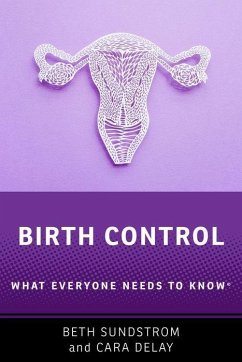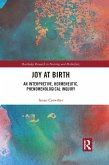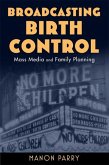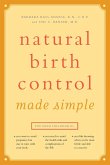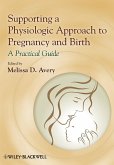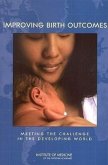16,99 €
inkl. MwSt.
Versandfertig in über 4 Wochen

8 °P sammeln
- Broschiertes Buch
- Merkliste
- Auf die Merkliste
- Bewerten Bewerten
- Teilen
- Produkt teilen
- Produkterinnerung
- Produkterinnerung
Birth Control: What Everyone Needs to Know(R) will offer more than a user's guide to available means of contraception: it will examine how supported family-planning infrastructure impacts society as a whole. Through reviews of policy, scientific literature, and supplemental interviews with women, it will uncover women's concerns and apprehensions about contraception, as well as the ways birth control empowers women and increases access to educational and professional opportunities. It will provide an overview the history of birth control, the risks and benefits of contraception, the role of…mehr
Andere Kunden interessierten sich auch für
![Joy at Birth Joy at Birth]() Susan CrowtherJoy at Birth36,99 €
Susan CrowtherJoy at Birth36,99 €![Birth Control and American Modernity Birth Control and American Modernity]() Trent MacNamaraBirth Control and American Modernity34,99 €
Trent MacNamaraBirth Control and American Modernity34,99 €![Broadcasting Birth Control Broadcasting Birth Control]() Manon ParryBroadcasting Birth Control47,99 €
Manon ParryBroadcasting Birth Control47,99 €![Natural Birth Control Made Simple Natural Birth Control Made Simple]() Barbara Kass-Annese R N C N PNatural Birth Control Made Simple17,99 €
Barbara Kass-Annese R N C N PNatural Birth Control Made Simple17,99 €![Supporting a Physiologic Approach to Pregnancy and Birth Supporting a Physiologic Approach to Pregnancy and Birth]() Supporting a Physiologic Approach to Pregnancy and Birth65,99 €
Supporting a Physiologic Approach to Pregnancy and Birth65,99 €![Reducing Birth Defects Reducing Birth Defects]() Institute Of MedicineReducing Birth Defects61,99 €
Institute Of MedicineReducing Birth Defects61,99 €![Improving Birth Outcomes Improving Birth Outcomes]() Institute Of MedicineImproving Birth Outcomes68,99 €
Institute Of MedicineImproving Birth Outcomes68,99 €-
-
-
Birth Control: What Everyone Needs to Know(R) will offer more than a user's guide to available means of contraception: it will examine how supported family-planning infrastructure impacts society as a whole. Through reviews of policy, scientific literature, and supplemental interviews with women, it will uncover women's concerns and apprehensions about contraception, as well as the ways birth control empowers women and increases access to educational and professional opportunities. It will provide an overview the history of birth control, the risks and benefits of contraception, the role of menstruation, and the future of birth control. The goal of this book is to provide accurate, unbiased scientific information about contraception in the context of women's lived experiences and the realities of how individuals make decisions about birth control.
Hinweis: Dieser Artikel kann nur an eine deutsche Lieferadresse ausgeliefert werden.
Hinweis: Dieser Artikel kann nur an eine deutsche Lieferadresse ausgeliefert werden.
Produktdetails
- Produktdetails
- Verlag: Oxford University Press
- Seitenzahl: 224
- Erscheinungstermin: 1. Juli 2020
- Englisch
- Abmessung: 206mm x 137mm x 18mm
- Gewicht: 249g
- ISBN-13: 9780190069667
- ISBN-10: 019006966X
- Artikelnr.: 57829246
- Herstellerkennzeichnung
- Libri GmbH
- Europaallee 1
- 36244 Bad Hersfeld
- 06621 890
- Verlag: Oxford University Press
- Seitenzahl: 224
- Erscheinungstermin: 1. Juli 2020
- Englisch
- Abmessung: 206mm x 137mm x 18mm
- Gewicht: 249g
- ISBN-13: 9780190069667
- ISBN-10: 019006966X
- Artikelnr.: 57829246
- Herstellerkennzeichnung
- Libri GmbH
- Europaallee 1
- 36244 Bad Hersfeld
- 06621 890
BETH L. SUNDSTROM is an associate professor of communication and public health and the director of the Women's Health Research Team (WHRT) at the College of Charleston in Charleston, South Carolina. Dr. Sundstrom is a Fulbright Scholar and leading expert on health communication, social marketing, and women's reproductive health. She is the author of Reproductive Justice and Women's Voices: Health Communication across the Lifespan along with more than 35 peer-reviewed articles published in top-tier journals, including Contraception, the Journal of Health Communication, and the Maternal and Child Health Journal, among others. Her health communication campaigns have received national recognition, including the 2014 multi-media award by the American Public Health Association. CARA DELAY, a historian with degrees from Boston College and Brandeis University, is Professor of History at the College of Charleston. She is also a faculty member on the Women's Health Research Team. Her research focuses on women's reproductive health, including the history of motherhood and childbirth. Her books include Irish Women and the Creation of Modern Catholicism, 1850-1950 (2019) and Women, Reform, and Resistance in Ireland, 1850-1950 (2015). She has written articles for Journal of Women's History, Women's History Review, Journal of Family History, Journal of British Studies, Lilith: A Feminist History Journal, Éire-Ireland, and Feminist Studies. She serves on the executive committee of the Women's History Association of Ireland (WHAI). Dr. Delay also is a regular writer for Nursing Clio, a website that interrogates the links between the past and the present, with a focus on women's reproductive history.
* I. Introduction: Birth Control Today
* a. Birth Control? Family Planning? Contraception?: What is the
difference?
* b. Women's voices: Understanding lived experiences
* c. Who needs birth control?
* i. What is unintended pregnancy?
* ii. How many women who do not use a method of birth control will
become pregnant over the course of one year?
* iii. What is the current rate of unintended pregnancy in the United
States?
* iv. Are there negative health effects of unintended pregnancy for
women and infants?
* v. Are there negative health effects of unintended pregnancy for
families and society?
* vi. How can birth control enhance women's lives?
* vii. How does birth control enhance family and community well-being?
* viii. What societal benefits does birth control offer?
* d. What is reproductive justice?
* i. How do the intersections of race/ethnicity, class/socioeconomic
status, ability, age, gender/sexuality, and immigration status serve
as sources of reproductive oppression and perpetuate social
inequality?
* ii. Why is birth control important to reproductive justice?
* iii. What are the popular perceptions of contraception?
* e. Birth control in the news
* a. What is "contraceptive scare"?
* II. What is birth control?
* a. How does birth control work?
* i. What are the different methods of birth control available today?
* i. What are hormonal methods of birth control?
* ii. What are non-hormonal methods of birth control?
* ii. What are the most commonly used methods?
* iii. How effective are today's methods of birth control in preventing
pregnancy?
* 1. What is perfect use?
* 2. What is typical use?
* v. What is emergency contraception (EC) or the morning after pill?
* 1. What is the difference between EC and abortion?
* 2. Where can I purchase EC?
* 3. How old do I have to be to purchase EC?
* vi. What are the benefits of dual protection?
* b. A brief history of birth control
* i. When was birth control invented?
* ii. What were historical methods of birth control?
* iii. When were modern methods of birth control invented?
* iv. How have laws about birth control changed over time?
* III. How do we know if birth control is safe?
* a. What are the risks and benefits of birth control?
* i. What are the risks of hormonal birth control?
* ii. What are the benefits of hormonal birth control?
* iii. What are the risks associated with pregnancy and childbirth?
* iv. Does hormonal contraception offer any health benefits?
* v. Does hormonal contraception treat or prevent heavy menstrual
bleeding, painful periods, PMS, and/or acne?
* vii. Does hormonal contraception treat or prevent pelvic inflammatory
disease, Polycystic Ovarian Syndrome (PCOS), fibroids, and/or
endometriosis?
* viii. Does hormonal contraception prevent colon, ovarian, and/or
endometrial cancer?
* ix. Why do I see alarming stories about the negative health effects
of birth control in the popular media?
* b. Do I need to have a period?
* i. Is there a medical reason to have a period every month?
* ii. Why do many types of hormonal birth control attempt to mimic a
"natural" 28-day cycle?
* iii. If I am using hormonal birth control, why do I have "withdrawal
bleeding" for one week every month?
* iv. Should I be reassured that "withdrawal bleeding" means I'm not
pregnant?
* v. Is it healthy to alter my cycle if I am using hormonal birth
control?
* IV. Beyond "the Pill:" Are there other options?
* a. Why do many people believe that "the Pill" and condoms are the
only or best forms of contraception available today?
* i. Why do women feel that "the Pill" is something that they can
control?
* ii. What is the myth of perfect use?
* iii. What is the paradox of inertia?
* b. What birth control methods do the experts recommend?
* i. What are long-acting reversible contraceptive (LARC) methods?
* 1. How do the LARC methods work?
* ii. Why are LARC methods considered the first-line contraceptive
recommendation for all women?
* iii. Are LARC methods effective?
* iv. Are LARC methods easy to access and use?
* v. How does the history of the Dalkon Shield impact opinions about
the IUD today?
* vi. What are the side effects of LARC methods?
* 1. Does the insertion of LARC methods hurt?
* 2. How do LARC methods impact menstruation?
* vii. How do LARC methods protect fertility?
* viii. Are these methods safe for women and adolescents?
* ix. Are these methods safe for women who have just had a baby?
* x. What do women think about LARC methods?
* 1. What is the "ick factor"?
* c. Why are some health care providers still not recommending LARC
methods to their patients?
* i. What options do health care providers offer women who are seeking
birth control?
* ii. Why do some health care providers resist providing some methods
to young women or women who have not yet had a baby?
* iii. Do I need an annual exam to get a prescription for birth
control?
* 1. Can my pharmacist prescribe hormonal contraception?
* 2. Can I get a year supply of birth control?
* d. Are there studies that show women prefer LARC methods when cost is
not an issue?
* i. Are there any communication campaigns that provide information or
resources about LARC methods?
* V. How does policy impact access to birth control?
* a. What are the barriers to correct, consistent use of birth control?
* i. Is cost a barrier to consistent use of contraception?
* ii. Does health insurance cover contraception?
* iii. Is access a barrier to consistent use of contraception?
* b. What laws and regulations make it difficult for women to access
birth control?
* c. What laws and regulations make it easier for women to access birth
control?
* i. How does the Affordable Care Act impact access to birth control?
* d. How do the media frame policy issues around birth control?
* VI. Conclusions: What is the future of birth control?
* a. How is telehealth changing access to birth control?
* i. Can I get birth control online?
* b. Why do experts want to move oral contraceptives over-the-counter
(OCs OTC)?
* i. Is it safe?
* ii. Is it healthy?
* iii. Would it still be covered by health insurance?
* iv. Are there any campaigns that provide more information about OCs
OTC?
* c. How can I weigh the evidence to make the best birth control choice
for me?
* d. Resources: How can I find more information?
* a. Birth Control? Family Planning? Contraception?: What is the
difference?
* b. Women's voices: Understanding lived experiences
* c. Who needs birth control?
* i. What is unintended pregnancy?
* ii. How many women who do not use a method of birth control will
become pregnant over the course of one year?
* iii. What is the current rate of unintended pregnancy in the United
States?
* iv. Are there negative health effects of unintended pregnancy for
women and infants?
* v. Are there negative health effects of unintended pregnancy for
families and society?
* vi. How can birth control enhance women's lives?
* vii. How does birth control enhance family and community well-being?
* viii. What societal benefits does birth control offer?
* d. What is reproductive justice?
* i. How do the intersections of race/ethnicity, class/socioeconomic
status, ability, age, gender/sexuality, and immigration status serve
as sources of reproductive oppression and perpetuate social
inequality?
* ii. Why is birth control important to reproductive justice?
* iii. What are the popular perceptions of contraception?
* e. Birth control in the news
* a. What is "contraceptive scare"?
* II. What is birth control?
* a. How does birth control work?
* i. What are the different methods of birth control available today?
* i. What are hormonal methods of birth control?
* ii. What are non-hormonal methods of birth control?
* ii. What are the most commonly used methods?
* iii. How effective are today's methods of birth control in preventing
pregnancy?
* 1. What is perfect use?
* 2. What is typical use?
* v. What is emergency contraception (EC) or the morning after pill?
* 1. What is the difference between EC and abortion?
* 2. Where can I purchase EC?
* 3. How old do I have to be to purchase EC?
* vi. What are the benefits of dual protection?
* b. A brief history of birth control
* i. When was birth control invented?
* ii. What were historical methods of birth control?
* iii. When were modern methods of birth control invented?
* iv. How have laws about birth control changed over time?
* III. How do we know if birth control is safe?
* a. What are the risks and benefits of birth control?
* i. What are the risks of hormonal birth control?
* ii. What are the benefits of hormonal birth control?
* iii. What are the risks associated with pregnancy and childbirth?
* iv. Does hormonal contraception offer any health benefits?
* v. Does hormonal contraception treat or prevent heavy menstrual
bleeding, painful periods, PMS, and/or acne?
* vii. Does hormonal contraception treat or prevent pelvic inflammatory
disease, Polycystic Ovarian Syndrome (PCOS), fibroids, and/or
endometriosis?
* viii. Does hormonal contraception prevent colon, ovarian, and/or
endometrial cancer?
* ix. Why do I see alarming stories about the negative health effects
of birth control in the popular media?
* b. Do I need to have a period?
* i. Is there a medical reason to have a period every month?
* ii. Why do many types of hormonal birth control attempt to mimic a
"natural" 28-day cycle?
* iii. If I am using hormonal birth control, why do I have "withdrawal
bleeding" for one week every month?
* iv. Should I be reassured that "withdrawal bleeding" means I'm not
pregnant?
* v. Is it healthy to alter my cycle if I am using hormonal birth
control?
* IV. Beyond "the Pill:" Are there other options?
* a. Why do many people believe that "the Pill" and condoms are the
only or best forms of contraception available today?
* i. Why do women feel that "the Pill" is something that they can
control?
* ii. What is the myth of perfect use?
* iii. What is the paradox of inertia?
* b. What birth control methods do the experts recommend?
* i. What are long-acting reversible contraceptive (LARC) methods?
* 1. How do the LARC methods work?
* ii. Why are LARC methods considered the first-line contraceptive
recommendation for all women?
* iii. Are LARC methods effective?
* iv. Are LARC methods easy to access and use?
* v. How does the history of the Dalkon Shield impact opinions about
the IUD today?
* vi. What are the side effects of LARC methods?
* 1. Does the insertion of LARC methods hurt?
* 2. How do LARC methods impact menstruation?
* vii. How do LARC methods protect fertility?
* viii. Are these methods safe for women and adolescents?
* ix. Are these methods safe for women who have just had a baby?
* x. What do women think about LARC methods?
* 1. What is the "ick factor"?
* c. Why are some health care providers still not recommending LARC
methods to their patients?
* i. What options do health care providers offer women who are seeking
birth control?
* ii. Why do some health care providers resist providing some methods
to young women or women who have not yet had a baby?
* iii. Do I need an annual exam to get a prescription for birth
control?
* 1. Can my pharmacist prescribe hormonal contraception?
* 2. Can I get a year supply of birth control?
* d. Are there studies that show women prefer LARC methods when cost is
not an issue?
* i. Are there any communication campaigns that provide information or
resources about LARC methods?
* V. How does policy impact access to birth control?
* a. What are the barriers to correct, consistent use of birth control?
* i. Is cost a barrier to consistent use of contraception?
* ii. Does health insurance cover contraception?
* iii. Is access a barrier to consistent use of contraception?
* b. What laws and regulations make it difficult for women to access
birth control?
* c. What laws and regulations make it easier for women to access birth
control?
* i. How does the Affordable Care Act impact access to birth control?
* d. How do the media frame policy issues around birth control?
* VI. Conclusions: What is the future of birth control?
* a. How is telehealth changing access to birth control?
* i. Can I get birth control online?
* b. Why do experts want to move oral contraceptives over-the-counter
(OCs OTC)?
* i. Is it safe?
* ii. Is it healthy?
* iii. Would it still be covered by health insurance?
* iv. Are there any campaigns that provide more information about OCs
OTC?
* c. How can I weigh the evidence to make the best birth control choice
for me?
* d. Resources: How can I find more information?
* I. Introduction: Birth Control Today
* a. Birth Control? Family Planning? Contraception?: What is the
difference?
* b. Women's voices: Understanding lived experiences
* c. Who needs birth control?
* i. What is unintended pregnancy?
* ii. How many women who do not use a method of birth control will
become pregnant over the course of one year?
* iii. What is the current rate of unintended pregnancy in the United
States?
* iv. Are there negative health effects of unintended pregnancy for
women and infants?
* v. Are there negative health effects of unintended pregnancy for
families and society?
* vi. How can birth control enhance women's lives?
* vii. How does birth control enhance family and community well-being?
* viii. What societal benefits does birth control offer?
* d. What is reproductive justice?
* i. How do the intersections of race/ethnicity, class/socioeconomic
status, ability, age, gender/sexuality, and immigration status serve
as sources of reproductive oppression and perpetuate social
inequality?
* ii. Why is birth control important to reproductive justice?
* iii. What are the popular perceptions of contraception?
* e. Birth control in the news
* a. What is "contraceptive scare"?
* II. What is birth control?
* a. How does birth control work?
* i. What are the different methods of birth control available today?
* i. What are hormonal methods of birth control?
* ii. What are non-hormonal methods of birth control?
* ii. What are the most commonly used methods?
* iii. How effective are today's methods of birth control in preventing
pregnancy?
* 1. What is perfect use?
* 2. What is typical use?
* v. What is emergency contraception (EC) or the morning after pill?
* 1. What is the difference between EC and abortion?
* 2. Where can I purchase EC?
* 3. How old do I have to be to purchase EC?
* vi. What are the benefits of dual protection?
* b. A brief history of birth control
* i. When was birth control invented?
* ii. What were historical methods of birth control?
* iii. When were modern methods of birth control invented?
* iv. How have laws about birth control changed over time?
* III. How do we know if birth control is safe?
* a. What are the risks and benefits of birth control?
* i. What are the risks of hormonal birth control?
* ii. What are the benefits of hormonal birth control?
* iii. What are the risks associated with pregnancy and childbirth?
* iv. Does hormonal contraception offer any health benefits?
* v. Does hormonal contraception treat or prevent heavy menstrual
bleeding, painful periods, PMS, and/or acne?
* vii. Does hormonal contraception treat or prevent pelvic inflammatory
disease, Polycystic Ovarian Syndrome (PCOS), fibroids, and/or
endometriosis?
* viii. Does hormonal contraception prevent colon, ovarian, and/or
endometrial cancer?
* ix. Why do I see alarming stories about the negative health effects
of birth control in the popular media?
* b. Do I need to have a period?
* i. Is there a medical reason to have a period every month?
* ii. Why do many types of hormonal birth control attempt to mimic a
"natural" 28-day cycle?
* iii. If I am using hormonal birth control, why do I have "withdrawal
bleeding" for one week every month?
* iv. Should I be reassured that "withdrawal bleeding" means I'm not
pregnant?
* v. Is it healthy to alter my cycle if I am using hormonal birth
control?
* IV. Beyond "the Pill:" Are there other options?
* a. Why do many people believe that "the Pill" and condoms are the
only or best forms of contraception available today?
* i. Why do women feel that "the Pill" is something that they can
control?
* ii. What is the myth of perfect use?
* iii. What is the paradox of inertia?
* b. What birth control methods do the experts recommend?
* i. What are long-acting reversible contraceptive (LARC) methods?
* 1. How do the LARC methods work?
* ii. Why are LARC methods considered the first-line contraceptive
recommendation for all women?
* iii. Are LARC methods effective?
* iv. Are LARC methods easy to access and use?
* v. How does the history of the Dalkon Shield impact opinions about
the IUD today?
* vi. What are the side effects of LARC methods?
* 1. Does the insertion of LARC methods hurt?
* 2. How do LARC methods impact menstruation?
* vii. How do LARC methods protect fertility?
* viii. Are these methods safe for women and adolescents?
* ix. Are these methods safe for women who have just had a baby?
* x. What do women think about LARC methods?
* 1. What is the "ick factor"?
* c. Why are some health care providers still not recommending LARC
methods to their patients?
* i. What options do health care providers offer women who are seeking
birth control?
* ii. Why do some health care providers resist providing some methods
to young women or women who have not yet had a baby?
* iii. Do I need an annual exam to get a prescription for birth
control?
* 1. Can my pharmacist prescribe hormonal contraception?
* 2. Can I get a year supply of birth control?
* d. Are there studies that show women prefer LARC methods when cost is
not an issue?
* i. Are there any communication campaigns that provide information or
resources about LARC methods?
* V. How does policy impact access to birth control?
* a. What are the barriers to correct, consistent use of birth control?
* i. Is cost a barrier to consistent use of contraception?
* ii. Does health insurance cover contraception?
* iii. Is access a barrier to consistent use of contraception?
* b. What laws and regulations make it difficult for women to access
birth control?
* c. What laws and regulations make it easier for women to access birth
control?
* i. How does the Affordable Care Act impact access to birth control?
* d. How do the media frame policy issues around birth control?
* VI. Conclusions: What is the future of birth control?
* a. How is telehealth changing access to birth control?
* i. Can I get birth control online?
* b. Why do experts want to move oral contraceptives over-the-counter
(OCs OTC)?
* i. Is it safe?
* ii. Is it healthy?
* iii. Would it still be covered by health insurance?
* iv. Are there any campaigns that provide more information about OCs
OTC?
* c. How can I weigh the evidence to make the best birth control choice
for me?
* d. Resources: How can I find more information?
* a. Birth Control? Family Planning? Contraception?: What is the
difference?
* b. Women's voices: Understanding lived experiences
* c. Who needs birth control?
* i. What is unintended pregnancy?
* ii. How many women who do not use a method of birth control will
become pregnant over the course of one year?
* iii. What is the current rate of unintended pregnancy in the United
States?
* iv. Are there negative health effects of unintended pregnancy for
women and infants?
* v. Are there negative health effects of unintended pregnancy for
families and society?
* vi. How can birth control enhance women's lives?
* vii. How does birth control enhance family and community well-being?
* viii. What societal benefits does birth control offer?
* d. What is reproductive justice?
* i. How do the intersections of race/ethnicity, class/socioeconomic
status, ability, age, gender/sexuality, and immigration status serve
as sources of reproductive oppression and perpetuate social
inequality?
* ii. Why is birth control important to reproductive justice?
* iii. What are the popular perceptions of contraception?
* e. Birth control in the news
* a. What is "contraceptive scare"?
* II. What is birth control?
* a. How does birth control work?
* i. What are the different methods of birth control available today?
* i. What are hormonal methods of birth control?
* ii. What are non-hormonal methods of birth control?
* ii. What are the most commonly used methods?
* iii. How effective are today's methods of birth control in preventing
pregnancy?
* 1. What is perfect use?
* 2. What is typical use?
* v. What is emergency contraception (EC) or the morning after pill?
* 1. What is the difference between EC and abortion?
* 2. Where can I purchase EC?
* 3. How old do I have to be to purchase EC?
* vi. What are the benefits of dual protection?
* b. A brief history of birth control
* i. When was birth control invented?
* ii. What were historical methods of birth control?
* iii. When were modern methods of birth control invented?
* iv. How have laws about birth control changed over time?
* III. How do we know if birth control is safe?
* a. What are the risks and benefits of birth control?
* i. What are the risks of hormonal birth control?
* ii. What are the benefits of hormonal birth control?
* iii. What are the risks associated with pregnancy and childbirth?
* iv. Does hormonal contraception offer any health benefits?
* v. Does hormonal contraception treat or prevent heavy menstrual
bleeding, painful periods, PMS, and/or acne?
* vii. Does hormonal contraception treat or prevent pelvic inflammatory
disease, Polycystic Ovarian Syndrome (PCOS), fibroids, and/or
endometriosis?
* viii. Does hormonal contraception prevent colon, ovarian, and/or
endometrial cancer?
* ix. Why do I see alarming stories about the negative health effects
of birth control in the popular media?
* b. Do I need to have a period?
* i. Is there a medical reason to have a period every month?
* ii. Why do many types of hormonal birth control attempt to mimic a
"natural" 28-day cycle?
* iii. If I am using hormonal birth control, why do I have "withdrawal
bleeding" for one week every month?
* iv. Should I be reassured that "withdrawal bleeding" means I'm not
pregnant?
* v. Is it healthy to alter my cycle if I am using hormonal birth
control?
* IV. Beyond "the Pill:" Are there other options?
* a. Why do many people believe that "the Pill" and condoms are the
only or best forms of contraception available today?
* i. Why do women feel that "the Pill" is something that they can
control?
* ii. What is the myth of perfect use?
* iii. What is the paradox of inertia?
* b. What birth control methods do the experts recommend?
* i. What are long-acting reversible contraceptive (LARC) methods?
* 1. How do the LARC methods work?
* ii. Why are LARC methods considered the first-line contraceptive
recommendation for all women?
* iii. Are LARC methods effective?
* iv. Are LARC methods easy to access and use?
* v. How does the history of the Dalkon Shield impact opinions about
the IUD today?
* vi. What are the side effects of LARC methods?
* 1. Does the insertion of LARC methods hurt?
* 2. How do LARC methods impact menstruation?
* vii. How do LARC methods protect fertility?
* viii. Are these methods safe for women and adolescents?
* ix. Are these methods safe for women who have just had a baby?
* x. What do women think about LARC methods?
* 1. What is the "ick factor"?
* c. Why are some health care providers still not recommending LARC
methods to their patients?
* i. What options do health care providers offer women who are seeking
birth control?
* ii. Why do some health care providers resist providing some methods
to young women or women who have not yet had a baby?
* iii. Do I need an annual exam to get a prescription for birth
control?
* 1. Can my pharmacist prescribe hormonal contraception?
* 2. Can I get a year supply of birth control?
* d. Are there studies that show women prefer LARC methods when cost is
not an issue?
* i. Are there any communication campaigns that provide information or
resources about LARC methods?
* V. How does policy impact access to birth control?
* a. What are the barriers to correct, consistent use of birth control?
* i. Is cost a barrier to consistent use of contraception?
* ii. Does health insurance cover contraception?
* iii. Is access a barrier to consistent use of contraception?
* b. What laws and regulations make it difficult for women to access
birth control?
* c. What laws and regulations make it easier for women to access birth
control?
* i. How does the Affordable Care Act impact access to birth control?
* d. How do the media frame policy issues around birth control?
* VI. Conclusions: What is the future of birth control?
* a. How is telehealth changing access to birth control?
* i. Can I get birth control online?
* b. Why do experts want to move oral contraceptives over-the-counter
(OCs OTC)?
* i. Is it safe?
* ii. Is it healthy?
* iii. Would it still be covered by health insurance?
* iv. Are there any campaigns that provide more information about OCs
OTC?
* c. How can I weigh the evidence to make the best birth control choice
for me?
* d. Resources: How can I find more information?
